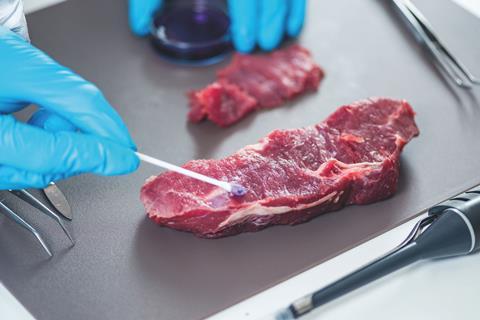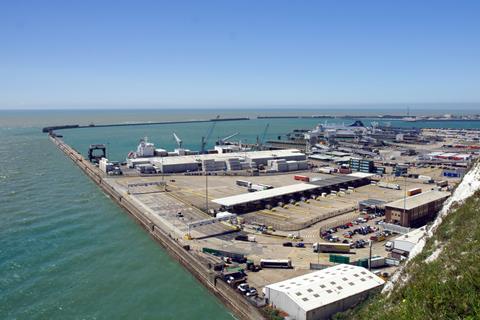The Environment, Food and Rural Affairs (EFRA) Committee has published its new report, ‘Biosecurity at the Border: Britain’s Illegal Meat Crisis’, which has warned that the Department for Environment, Food and Rural Affairs’ (Defra) approach to personal meat imports has been “unnecessarily lax”.

The Committee, which is chaired by Alistair Carmichael MP, examined the UK’s biosecurity measures as part of an inquiry on animal and plant health, calling Defra’s approach to personal meat imports “too reactive and overly complicated”.
The Committee went on to highlight that British farmers should not be “undercut by cheap, poor quality animal products”, and recommended Defra commission a risk assessment “of the type published by the Veterinary Laboratories Agency in 2004” for the import of contaminated meat and meat products into Great Britain and subsequent exposure of livestock.
It said that Defra should model illegal meat imports, the probability of contaminated meat, the probability of livestock infection and the amount of illegally imported meat that is sold in Great Britain, while also publishing quarterly data relating to seizures of illegally imported animal products made at the border and inland, broken down by type.
EFRA found that Defra’s ban on personal imports of most animal products from the EU was a “welcome simplification” and strengthening of the rules, but said that there was “not enough public awareness” of the restrictions or the reasons for them. It concluded that a demand for cheap meat and culturally preferred products had fuelled an “influx of illegal imports” to Great Britain.
Looking outside the UK, the EFRA Committee detailed how travel operators “should be legally compelled” to inform travellers of the rules for personal imports from the EU into GB, urging Defra to “scale up” its communications to the public about personal import rules. As well as this, it was recommended that Defra produce a digital tool for travellers to identify what they can bring into the country.
Developing a strategy to reduce illegal meat imports
The report recommended that Defra work with the Food Standards Agency (FSA) and Food Standards Scotland (FSS) to design a strategy to reduce demand for illegally imported products, while also considering how to engage with Eastern European communities in Great Britain to raise awareness of animal disease risks and controls.
The EFRA Committee concluded that there was “more that Defra could and should be doing to prevent animal diseases like foot and mouth and African swine fever”. It said that there was no encompassing strategy to tackle point of animal origin (POAO) smuggling and “structures to facilitate inter-agency working are incomplete”, stating that Defra had not presented a convincing plan to address these issues.
To combat this, it suggested Defra create a strategy for POAO smuggling by 2026 as part of a collaboration with FSA’s National Food Crime Unit (NFCU), and suggested a taskforce for illegal imports of animal products should be established by November 2025 and led by the Minister for Biosecurity.
Submitting evidence for the inquiry, Lizzie Wilson, chief executive of the National Pig Association (NPA), outlined that an outbreak of African swine fever in the UK would have an immediate loss of its pork export market, as well as control zones and movement restrictions on animals, people and vehicles, and culling of infected herds.
Wilson questioned whether pig farmers would be able to restock after an outbreak of African swine fever, especially due to “the ongoing effects of the 2020-22 industry crisis”, and warned that “Government will be complicit” in the event of an outbreak “if they have not stopped the meat, that they are entirely aware of, from coming into this country”.
Other recommendations include giving port health authorities stop, search and seize powers in relation to animal products, integrating local authorities into formal information sharing and intelligence networks and delivering a plan to fine and prosecute repeat offenders.

Dover Port
After finding an “unacceptable breakdown of trust, communication and cooperation” in the relationship between Defra and Dover Port Health Authority (DPHA), the report suggested Government restore an “effective, mutual relationship”.
It also suggested Defra look at repurposing and renovating Dover Port, after stating that the space and facilities there were “not suitable” for seizing high volumes of potentially contaminated meat.
When submitting evidence, DPHA workers described “a sense of futility” that while they are conducting checks, a lack of resources means “hundreds of targeted vehicles drive straight past”. It was revealed in the report that on some ferries, especially overnight when tickets were cheapest, DPHA estimated there to be more than 50 vans containing illegal animal products and at least 40 of these would drive through unchecked.
As a result, the report recommended Defra engage with Border Force and the Port of Dover on renovation of inspection sheds and investment in facilities for the benefit of workers, biosecurity and customers travelling through the port.
Chair of the EFRA Committee, Alistair Carmichael MP, said: “Every day, vans laden with undeclared, unhygienic and unrefrigerated meat are rolling through our ports for distribution and sale in Britain. The authorities tasked with tackling this wave of illegal produce find themselves without the necessary leadership, resources and intelligence to do so.
“It would not be an exaggeration to say that Britain is sleepwalking through its biggest food safety crisis since the horse meat scandal. A still bigger concern is the very real risk of a major animal disease outbreak. The single case of foot and mouth disease in Germany this year, most likely caused by illegally imported meat, cost its economy one billion euros.
“This problem has been building over a number of years under successive governments. We are calling on this Government to get a grip on what has become a crisis, by establishing a national taskforce with proper leadership and a strategy, boosting food crime intelligence networks, creating and enforcing real deterrents to tackle the criminal enterprises involved and equipping port health and local authorities with the resources and the powers they need.”
“Action is needed” says industry
The British Poultry Council (BPC) welcomed the report, sharing concerns over illegal imports of meat and dairy products. BPC chief executive Richard Griffiths commented: “This report highlights how decades of work to strengthen UK food security, biosecurity, and animal health are being undermined by illegal meat.
“The lack of clear ownership, resources, and coordination in this area is unacceptable. We support the Committee’s call for a national taskforce and a coherent strategy to tackle products of animal origin (POAO) smuggling.
“Action is needed to close gaps and equip authorities and agencies with the resources required to protect food supply chains.
“British poultry meat producers operate to high standards. Those standards mean nothing without stopping illegal meat. We look forward to working with our new Defra Ministers to ensure strong oversight, robust action, and the integrity of our food supply chains.”
National Farmers’ Union (NFU) president Tom Bradshaw said: “The EFRA committee report highlights the concerns that we have been raising for the past few years – that increasing illegal meat imports heightens the risk of animal diseases such as foot and mouth disease and African swine fever coming to our shores, threatening not only livestock farming businesses, our economy and national food security, but hugely impacting the UK’s ability to trade.
“We need a coordinated strategy across Government, local authorities and local port health authorities and sufficient investment to counter the biosecurity risks the UK faces from these illegal meat imports. Government has committed to toughening the penalties for those that are caught, and we must see that implemented immediately so vehicles involved can be crushed at the earliest opportunity.”
NPA chief executive Lizzie Wilson commented: “This report further validates our messaging now that the flaws in its [Government’s] approach have been outlined so clearly and comprehensively by the EFRA Committee. There is nowhere left to hide, now. It must step up.”
Wilson also highlighted a recent report by Politico on the £800 million ‘wasted’ on new facilities that might never be used under the Government’s post Brexit import strategy: “These sorts of figures are hugely frustrating for all involved with UK livestock in light of the Government’s refusal to properly fund illegal meat import checks at the border.”
The full report can be accessed here.












